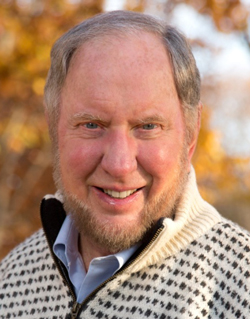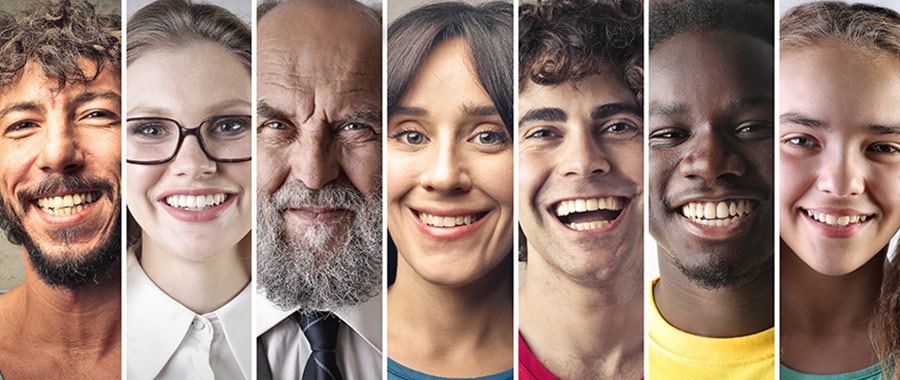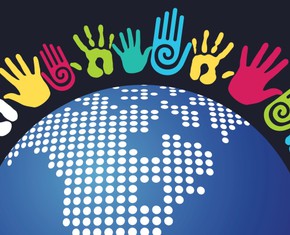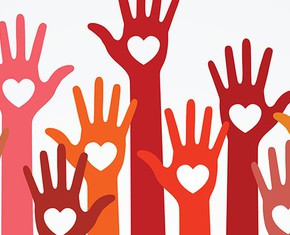The views expressed in our content reflect individual perspectives and do not represent the authoritative views of the Baha'i Faith.
Who’s in your community? No, not the village, town or city you live in—I mean your actual personal community, the people you know and care about.
The dictionary defines a community as a unified body of individuals, held together by something larger than themselves.
We probably all have a community we’ve built around us, at least to some extent. The people you love, your family, your neighbors, your friends, your colleagues, your online friends, too—they typically make up your community, that group of people you know and who know you, the people you’ve made a real human connection with, the ones who care about you.
But do you actually belong to a community? Remember the definition: a unified body of individuals, held together by something larger than themselves.
Look at it this way: who in your community of family, friends and neighbors would help you if you were in trouble? Who would come to your aid if you lost your job, got sick, became disabled? Who would reach out to you if you were hungry and couldn’t feed yourself or your family? Who in your community truly loves you, and has the motivation to really express it?
Most importantly, where does your sense of belonging to a community actually come from?
Since our communities can make such a huge difference, not only for individuals but for the world, the Baha’i teachings have a powerful emphasis on building community. Baha’is believe that forging human unity and togetherness has become the chief challenge and opportunity of our modern age. Strikingly, the Baha’i writings make the stunning claim that achieving unity—the most important part of the word community—can effectively address all other human problems:
It is my hope that others as well will achieve illumined eyes and hearing ears, and attain to everlasting life: that these many rivers, each flowing along in diverse and separated beds, will find their way back to the circumambient sea, and merge together and rise up in a single wave of surging oneness; that the unity of truth, through the power of God, will make these illusory differences to vanish away. This is the one essential: for if unity be gained, all other problems will disappear of themselves. – Abdu’l-Baha, Selections from the Writings of Abdu’l-Baha, p. 30.
So let’s look at that challenge, and try to determine, in this hyper-individualized age, what it takes to build a personal community—and a world community:
I ask you, is not fellowship and brotherhood preferable to enmity and hatred in society and community? The answer is self-evident. Love and fellowship are absolutely needful … We must be united. We must love each other. – Abdu’l-Baha, Foundations of World Unity, p. 99.
Which begs the question: what makes a thriving, healthy, smoothly-functioning community? Increasingly, both religion and science look at the quality of the relationships in that community.

Robert Putnam
A Harvard public policy professor and author named Robert Putnam, in his book called Bowling Alone, writes that our modern society has suffered a “collapse of community.” Putnam presents evidence that we meaningfully connect with each other less than ever before; we belong to fewer social organizations, religious groups and clubs; we even have 43% fewer family dinners than we did a few decades ago. This has happened, Professor Putnam concluded after several years of research, because of longer work hours, changes in generational and family structure, the fact that most people now live isolated from one another in cities and suburbs, the influence of television and social media, and many other factors.
So how do we fix those problems—how can we bring a healthy sense of connectedness and cooperation back into our cultures? Putnam and many others say that we can generate trust, reciprocity, information flows and quality social cooperation by coming together in unity for the good of our communities.
Sociologists call this overall concept “social capital”—the idea that we all derive individual, collective and even economic benefits from the connections we build among our social networks.
Social capital, in other words, comes from helping others, from weaving together a tapestry of caring relationships, creating a genuine sense of unity, mutuality, service and cooperation. When we build social capital, it shows us that we’re not alone, that we don’t have to stand up to the world and its problems as a single, isolated individual—but instead can unify as a group to face our common challenges.
Building social capital is simple: find a community that shares your beliefs and get to know those people. Invest your time and energy to help others, and that expenditure of energy will invariably come back to you, increased exponentially. You will not only build social capital, you’ll contribute to the good of the community and advance the higher goals of society.
There are other rewards, as well: you’ll also begin to lose the sense of alienation you may have felt previously, and start generating new feelings of belonging, love and connection you never expected to encounter. You’ll meet like-minded, similarly selfless people and make new friends. It’s fun, too—the other-directed acts that build social capital can also include a significant amount of laughter and joy.
Baha’is believe that this kind of social capital-building best occurs when each person equates their own welfare with the community’s welfare—when we recognize our role as a single cell in the unified body of humankind. The Baha’i teachings tell us that this kind of selfless devotion to others can then become an attribute of spiritual perfection:
This means to have no regard for one’s own personal benefits and selfish advantages, and to carry out the laws of God without the slightest concern for anything else. It means to see one’s self as only one of the servants of God, the All-Possessing, and except for aspiring to spiritual distinction, never attempting to be singled out from the others. It means to consider the welfare of the community as one’s own. It means, in brief, to regard humanity as a single individual, and one’s own self as a member of that corporeal form, and to know of a certainty that if pain or injury afflicts any member of that body, it must inevitably result in suffering for all the rest. – Abdu’l-Baha, The Secret of Divine Civilization, p. 38.
Would you like to begin building some social capital? It’s not hard—just do a little research, talk to others, identify a group of like-minded people who share your beliefs and offer to voluntarily participate and help. Don’t do it solely for your own benefit—do it for the benefit of all. That will inevitably produce new learning, new relationships and new spiritual energy. The time and effort you expend will generate reciprocal sacrifice and selflessness in others, and when that happens you’ll become the beneficiary of those selfless efforts.
The Baha’i community welcomes anyone who would like to join in and help with our global community-building efforts. Baha’is everywhere try to carry forward an ever-advancing civilization in the quest for human harmony and an end to war. If you want to work with others toward racial unity, global peace and the oneness of humanity, we would love to meet you, and build some social capital together.
















Comments
Sign in or create an account
Continue with Googleor